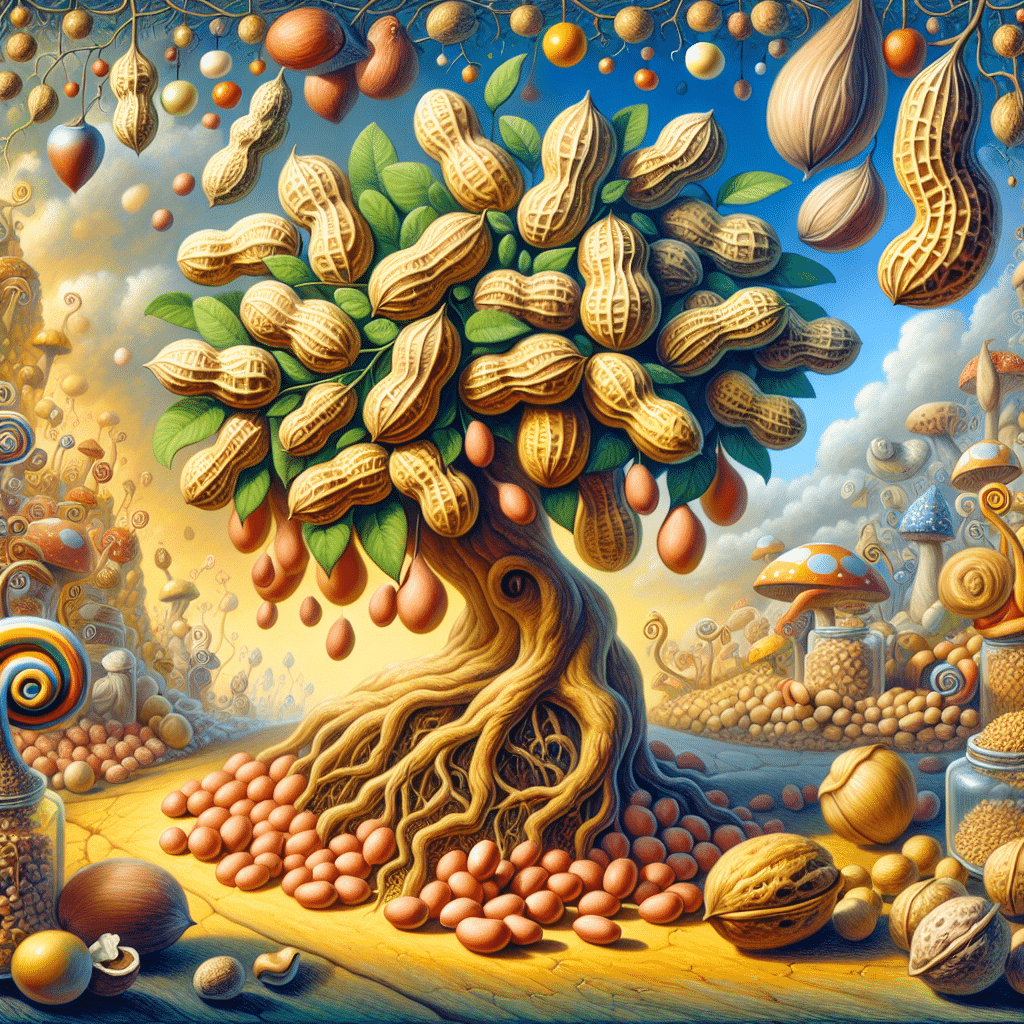Peanut Bush: Growing Into The Nutty World
-
Table of Contents
- Growing Peanut Bush: A Guide to Cultivating Your Own Nutty Harvest
- Understanding the Peanut Bush
- Optimal Conditions for Growing Peanuts
- Planting and Caring for Peanut Bushes
- Harvesting and Curing Peanuts
- Benefits of Growing Peanut Bushes
- Challenges in Peanut Cultivation
- Case Studies and Statistics
- Conclusion: Embracing the Nutty World of Peanut Bushes
- Discover ETprotein’s Premium Protein Products
Growing Peanut Bush: A Guide to Cultivating Your Own Nutty Harvest

Peanuts, also known as groundnuts or goobers, are a staple in diets around the world, revered for their nutritional value and versatility. However, what many don’t realize is that peanuts grow from a fascinating plant known as the peanut bush. This legume is unique in its growing process and offers a rewarding experience for gardeners and farmers alike. In this article, we’ll delve into the world of peanut bushes, exploring how to grow them, their benefits, and the impact they have on agriculture.
Understanding the Peanut Bush
The peanut bush (Arachis hypogaea) is a warm-weather legume distinguished by its unusual fruiting habit. Unlike most plants, the peanut flowers above ground, but the peanuts themselves develop underground. This phenomenon is known as geocarpy, a rare trait among flowering plants. The peanut bush is not actually a bush but a herbaceous plant that can reach up to 18 inches in height.
Optimal Conditions for Growing Peanuts
To successfully grow peanut bushes, certain conditions must be met:
- Climate: Peanuts require a long, warm growing season of at least 120 frost-free days, with optimal temperatures ranging between 70°F and 80°F.
- Soil: Well-drained, sandy loam soil with a pH between 5.9 and 7 is ideal for peanut cultivation. The loose structure allows the pegs to penetrate easily and form peanuts underground.
- Sunlight: Full sun exposure is necessary for the peanut bush to thrive and produce a healthy crop.
- Water: While peanuts are somewhat drought-tolerant, they require consistent moisture, especially during flowering and pegging stages.
Planting and Caring for Peanut Bushes
Planting peanuts begins with choosing the right variety for your region and preparing the soil. Raw, unroasted peanuts are used as seed, and it’s best to plant them after the last frost when the soil has warmed. Sow seeds about 1 to 1½ inches deep and 6 to 8 inches apart in rows spaced 24 to 36 inches apart.
Care for peanut bushes involves:
- Regular weeding to prevent competition for nutrients and water.
- Mulching to maintain soil moisture and temperature.
- Gentle fertilization, as peanuts fix their own nitrogen but may benefit from added phosphorus and potassium.
- Monitoring for pests such as cutworms, wireworms, and aphids.
Harvesting and Curing Peanuts
Harvesting peanuts is a delicate process. When the leaves begin to yellow and the inner shells have a veined, golden-brown appearance, it’s time to harvest. Loosen the soil around the plants and gently lift the entire plant, shaking off excess soil. The peanuts should be hung or laid out to dry in a warm, dry area with good air circulation for several days to a few weeks, depending on humidity levels. This curing process is crucial for flavor development and storage longevity.
Benefits of Growing Peanut Bushes
Growing peanut bushes offers several advantages:
- Nutritional Value: Peanuts are rich in protein, healthy fats, vitamins, and minerals, making them a nutritious addition to any diet.
- Soil Health: As nitrogen-fixing plants, peanuts can improve soil fertility, reducing the need for chemical fertilizers.
- Economic Opportunity: For farmers, peanuts can be a profitable crop due to their demand in various industries, from food to cosmetics.
- Sustainability: Peanut plants have relatively low water requirements compared to other nuts, contributing to more sustainable agricultural practices.
Challenges in Peanut Cultivation
Despite their benefits, growing peanuts also presents challenges. Diseases such as leaf spot and root rot can affect yield, while aflatoxin, a toxin produced by certain molds in improperly stored peanuts, poses health risks. Integrated pest management and proper post-harvest handling are essential to mitigate these issues.
Case Studies and Statistics
Several case studies highlight the success of peanut cultivation in various regions. For instance, in Georgia, USA, which produces nearly half of the country’s peanuts, research and extension programs have led to improved varieties and farming practices, enhancing yields and sustainability. According to the National Peanut Board, the average yield in the United States has increased from around 2,000 pounds per acre in the early 2000s to over 4,000 pounds per acre in recent years.
Conclusion: Embracing the Nutty World of Peanut Bushes
Growing peanut bushes can be a rewarding endeavor for both home gardeners and commercial farmers. With proper care and attention to the unique needs of the peanut plant, one can enjoy a bountiful harvest that offers nutritional, environmental, and economic benefits. By understanding the optimal conditions, planting techniques, and challenges, anyone can tap into the nutty world of peanut cultivation.
Discover ETprotein’s Premium Protein Products
If you’re interested in the health benefits of peanuts and other plant-based proteins, ETprotein offers a range of high-quality protein products. Their selection includes organic rice protein, clear rice protein, pea protein, clear pea protein, pumpkin seed protein, sunflower seed protein, mung bean protein, and peanut protein. These products are ideal for those looking to incorporate more plant-based proteins into their diet or for manufacturers seeking reliable ingredients for their food and beverage products.
About ETprotein:
ETprotein, a reputable protein Chinese factory manufacturer and supplier, is renowned for producing, stocking, exporting, and delivering the highest quality organic bulk vegan protein and plant proteins. They include Organic rice protein, clear rice protein, pea protein, clear pea protein, pumpkin seed protein, sunflower seed protein, mung bean protein, peanut protein etc. Their offerings, characterized by a neutral taste, non-GMO, allergen-free attributes, cater to a diverse range of industries. They serve nutraceutical, pharmaceutical, cosmeceutical, veterinary, as well as food and beverage finished product distributors, traders, and manufacturers across Europe, USA, Canada, Australia, Thailand, Japan, Korea, Brazil, and Chile, among others.
ETprotein specialization includes exporting and delivering tailor-made protein powder and finished nutritional supplements. Their extensive product range covers sectors like Food and Beverage, Sports Nutrition, Weight Management, Dietary Supplements, Health and Wellness Products, and Infant Formula, ensuring comprehensive solutions to meet all your protein needs.
As a trusted company by leading global food and beverage brands and Fortune 500 companies, ETprotein reinforces China’s reputation in the global arena. For more information or to sample their products, please contact them and email sales(at)ETprotein.com today.














